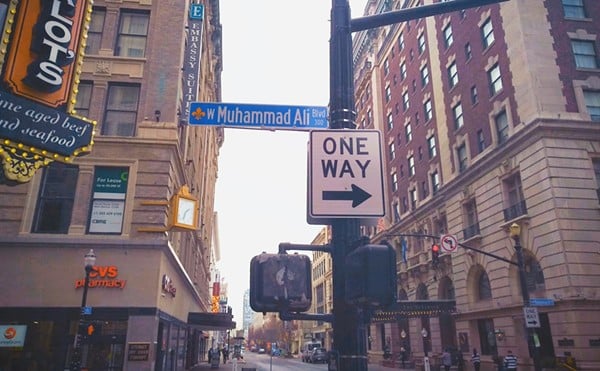Stephen Gaghan is a man with more talent and life experience than most of the rest of us could ever hope to understand. Our city his sent forth some fine artists, but so far only one — Gaghan — has won an Oscar (screenwriting for “Traffic,” in 2001). The signal fact of his success as a storyteller is that his ability to write and move people emotionally was forged in the crisis of drug addiction. And his ability was not destroyed by that addiction. The specter of dope, and dependency in general, hangs heavily over his best works (“Traffic,” “Syriana”), and his best works are as good as anything American cinema has seen since the glory days of the Ashby-Hopper-Coppola-Altman-Scorsese 1970s. [img_assist|nid=614|title=Photo by Glen Wilson / Warner Bros. Pictures|desc=Stephen Gaghan wrote and directed “Syriana,†and his screenplay is nominated for an Academy Award. He already owns an Oscar for “Traffic.â€|link=|align=left|width=133|height=200]
Gaghan himself is less ambitious than eager. Eager to write better screenplays, make better films, but with seemingly no ambition to add his name to any sort of pantheon, especially when there is more work to do and more stories to tell. Great artwork comes from pain, and Gaghan is a great artist. A great director can tell any story and make it shine, just as a great singer can turn the lamest song into a heartbreaking masterpiece. A great artist either creates new worlds from whole cloth or else lives the story and retains the ability to recount it.
Gaghan is obviously in the latter category. These days mark a transitional time for him. With “Traffic” and the accrued cache of the TV work he’d done before, he got bumped up to the A-list, but when the got to direct, he stumbled with Katie Holmes and “Abandon.” His most recent directorial effort, “Syriana,” puts him squarely back on the top tier for the foreseeable future and cements his status as one of the best director-writers currently operating. (Gaghan is nominated for an Academy Award in screenwriting for “Syriana.” George Clooney, who co-starred in the film, is also nominated for Best Supporting Actor.)
I reached Gaghan not long after “Syriana” hit the big screen, and found him plainspoken and earnest in answering a host of disparate questions with little connecting thread. What he has to say seems self-explanatory, and best left largely unedited.
LEO: Who are your favorite writers?
Stephen Gaghan: I like so many different writers in different forms, but I tend to go work by work because people have good books and bad, good films and bad. Usually it’s just people I’ve been thinking about lately. Novelists: Graham Greene (“The Count”); Leo Tolstoy, Chekhov — particularly for his innovations in dramatic writing. Faulkner, Richard Yates, Nathaniel West, too many to mention, really.
LEO: People working today?
SG: I thought “The Corrections” was a major book. I think Richard Ford’s “Sportswriter” and “Independence Day” are classics. In fact, I think if Ford knocks out the third in the trilogy and it’s as good as the second, they should give him the Nobel. Of film writers, that much-maligned group, I think Eric Roth is really good. Scott Frank. Frank Pierson. Oddly, I think it’s harder to get into the hall of fame in screenwriting than in fiction writing. To my way of thinking, you only have to write two great scripts. One great script and you’re a great screenwriter, two and you’re in the hall of fame. But almost no one has written two great scripts. Pierson and Roth probably have. Alvin Sargent. Maybe Robert Bolt. Maybe Dalton Trumbo. There are a lot of pros out in Hollywood and New York, people that can craft a good, shootable scene, who write clean, fast stuff, but they either have no souls or no ambition and really just get hooked on the money so fast it’ll make your head spin. These are the people about whom Trumbo said, circa 1950, “They pay you a thousand bucks a week, and pretty soon you think you need it.” I think, hey, a thousand a week, that ain’t bad.
LEO: So as a director, who are your favorite directors?
SG: All time hall of fame: Rossellini, Coppola, Clouzot, Godard, De Sica, Howard Hawks, Hal Ashby, Tarkovsky, particularly “Andre Rublev,” which is a film you can watch over and over, understanding more each time. I love “Z” and “Battle of Algiers.” “The 400 Blows” is incomparable and perfect. More recently, I loved “Sexy Beast,” “Punch Drunk Love,” “Eternal Sunshine of the Spotless Mind”... Michael Mann is always doing something interesting, and usually Fincher is, too. Even if the films don’t completely gel, there’s tons to learn from. I love the cinematographers Robert Elswit, Harris Savides, Ellen Kuras and Matty Libatique. This year I really loved “Junebug.” The last line of that film, how it’s delivered, where, the shooting, just slays me ... as good as the last line of “Breathless.”
LEO: Ever been approached by HBO to work on “The Wire” or “The Sopranos”? Some of these shows, including Showtime’s “Sleeper Cell,” seem to copy some of your moves.
SG: Friends of mine, Robin Green and Mitch Burgess, who I met when writing for “American Gothic,” are the Sopranos’ producers under David Chase, and early on, when they only had a pilot, they reached out to me to see if I’d want to write on the show. I watched the pilot, and the great genius Gaghan decided it sucked. I didn’t buy the shrink, thought her performance blew, felt the ducks in the pool was derivative and mannered, all that kind of pseudo-critical theory bullshit you can pile onto something. Really, I’d decided I didn’t want to write TV anymore, and wasn’t going to be tempted even by something good, because no matter what, on the very best day ever on “The Sopranos,” you’re still serving someone else’s voice, and that’s not the business I want to be in, and isn’t why I write.
LEO: If oil is the West’s biggest addiction, then what is the cure, and how bad will the withdrawal be?
SG: Imagine 300 million starving, shivering monkeys huddled naked in their own piss and shit waiting for some Democrat president to get the solar energy panels up on the roof of America. It’s gonna hurt worse than kicking nicotine. It’s gonna hurt. But we are a plucky, can-do lot here in the USA, and I think we’ll figure it out. Not before we’ve done irreversible damage to the earth but, hey, that’s not W’s problem is it? Because he will have choked on a pretzel and gone to the great Skull and Bones frat party in the sky long before Kentucky becomes a desert. And, truthfully, it’s hard for me to be too critical, since although i’m trying to become “carbon-neutral.” I still have a ’66 GTO, which I do drive about once a month.
LEO: Do you read a lot of new fiction to look for stories, or will you be continuing to work up your own original scripts?
SG: I usually find some book or underlying thing that has the seed of an idea, something that I’m interested in, that is a jumping off point from which to make up an entire world. I’ve needed this for some reason, a flag to plant in the sand with the studios, something to get me going. ... I’m trying to change that currently by writing something that is truly strange while also writing something loosely based on the book “Blink” by Malcolm Gladwell.
LEO: Regarding the British “Traffik” miniseries, what was your method for adapting it? What were its strong and weak points (as you perceived them), and is it easier to write an original script or an adaptation?
SG: I was working on a satire on the war on drugs for over a year before I ever met (director Steven) Soderbergh and “Traffik.” We had lunch and he pitched me the miniseries. But I was already writing the same thing, I said, at Fox 2000 (Films). I watched it once and realized that the problem I was having writing my film was because I had a single protagonist. And he had to virtually time travel around to cover all the turf I was trying to fit in: Columbia, Bolivia, Mexico, San Diego, Washington, Louisville (where it was originally set moved to Ohio because Cincinnati has better looking inner city locations). So I watched the miniseries and knew I was stealing that approach. But I loved “King of the Hill,” Soderbergh’s film, and wanted to work with him, so we threw in together. At that point, I never watched the miniseries a second time. Truthfully, I admired the scope of it, but when push came to shove I found the plot mechanics largely forced and that it was very melodramatic. So I fought against this draft after draft. Ultimately, I had some of those devices forced on me. They tidy up some loose ends in a handy way. But the only story I care about is Benicio (Del Toro’s) because that’s the one we made up from whole cloth and the one that came out of my research in and on Mexico. I also like some of what (Michael) Douglas discovers in Washington, which also came from my own observations of our little Nigeria on the Potomac. And much of Erika Christensen’s drug use and adventures are my own use and adventures, so it’s kind of nice to have made use of all that wasted time.
In terms of adapting, I just don’t look at the underlying stuff very much. There was a book under “Abandon.” I think all they shared in common is that they take place in college. There is a book under “Syriana” (Robert Baer’s “See No Evil”), but less than one paragraph and none of the plot or stories come from it. There is a book under my next one, but it is really just a point of departure. “Traffic’s” strong points ultimately were showing that upper middle-class kids, our best and brightest, our hopes for the future, were fueling the misery of this international interdiction biz known as the War on Drugs. And Soderbergh’s reintroduction of doc-style shooting to mainstream Hollywood filmmaking. The idea that it’s a health care issue rather than a police issue was and remains a valid point for somebody to be raising.
LEO: Is there anything particular about Louisville and/or growing up here that informs your current work to a significant or noticeable degree?
SG: I think coming from the south and having been a bit of a generalist, living many places, trying many careers, etc., gives me a bit of an advantage in that I have a peculiar perspective. A lot of talk in Hollywood centers on “the flyover,” “the red state punters,” “the middle,” and it’s extremely helpful to actually consider oneself a “red state punter.” My parents still live on the middle of the block in the middle of the neighborhood in the middle of the city in the middle of the country, and I have many friends in Louisville still. I’m trying to push the envelope of what is a “Hollywood film,” but I’m doing it in a way that doesn’t lose sight of the fact that I am the audience. I am the person I’m trying to reach. I know, because I don’t underestimate where I’m from, the people who are where I’m from. And I believe that a lot of other people do underestimate. They look out the window of their jets as they cross the country on their way to Europe and think ... well, I don’t know what they think, but if you look at the average film released in this country, they’re not thinking very highly of the audience.[img_assist|nid=615|title=Photo by Glen Wilson / Warner Bros. Pictures|desc=Gaghan and co-star George Clooney on the set of “Syriana.â€|link=|align=right|width=200|height=130]
LEO: Does moving within the higher Hollywood echelons come easily to you, or is it predatory and difficult and a pain in the ass? Does it help or hinder the creative process?
SG: I just find that the higher up the ladder you scrabble, the more people are focused on problem-solving and the less ego-driven it seems to be. The more talented and experienced the collaborator, be it a studio head or a huge star or producer, the more focused everyone is on solving things. Everyone can pretty quickly identify what’s wrong, but there’s a whole class of people who just go to lunch and gossip, and these are the people I like to avoid.
LEO: Any outside hobbies? Are you a big music fan, or sports, or politics or comic books or whatever?
SG: I love music and movies and playing with my children and surfing and snowboarding. I can surf in my backyard and sometimes go out twice in the same day. This is the biggest drawback to Louisville — no break on the Ohio.
LEO: Your political stance seems clear from the films, but is there anything specific you’d like to state regarding the status quo? Since “Syriana” deals with the geopolitics of oil, I suppose it is fair to ask what you think about our presence in Iraq.
SG: I stand with President Reagan’s National Security Adviser, General (William) Odom, who said he thinks it will be “the single biggest strategic error in the history of the United States. It was a colossal fuck-up. We’re handing the country to Iran. There will be civil war. We destroyed the place, murdered so many children. For what? So Exxon and BP could make record profits quarter after quarter. I also think they lied to get us into the war. I think that if the Democrats take back Congress, there will be impeachment proceedings against the president.
LEO: Is there anything at all good about drugs (in general) vis-a-vis the creative process?
SG: No. Drugs and alcohol are a massive distraction. At first they’re a crutch to have connection with strangers and friends, but rapidly they become the end in themselves and you have less connection than you had before — which in many cases is zero — so you end up in a hole. I would binge and then write to try to stave off depression. I never wrote one usable sentence drunk or high. It was like having two arms and one leg tied behind your back, hopping around shrieking “look at me” while you try to be filmmaker, husband, friend. What a joke.
LEO: How involved are you in the casting process, and what are your main criteria?
SG: I make every casting decision, no exceptions. I don’t want to see the strings, don’t want to feel the person acting. They have to be capable of inhabiting it, of making it feel true, or it won’t work for me.
LEO: What was it like to work with William Friedkin on “Rules of Engagement”?
SG: I love Billy. No two ways about it. He’s a great guy and a great storyteller, and he made a perfect film, but it wasn’t “Rules of Engagement.”*
LEO: One last question. What do you say to the consistent criticism that “Syriana” is too complex for the average viewer to follow, that it is downright confusing? Also, are you particularly drawn to complicated works of art — you know, James Joyce or Pynchon or Tolstoy, something along those lines?
SG: We shot over 200 different locations on four continents in 75 days, which is a lot. We also came in four million under budget. But now I’m so damn sick of all things “Syriana,” I just want it to go away. So that’s it. … (But) the film is not too complex. It’s challenging but also works. It works even if you don’t understand every last thing on the first viewing. This said, I probably cut too much out of it, some scenes with Bob and his wife, Bennett and his father, that really let the piece breathe, let the audience orient, that made it less “schematic,” particularly in the second half. Who the hell knows. I don’t think I’m drawn to complexity per se, but I know what I like is shit that feels real and truthful. One little moment of human truth can sustain me for a long, long time. And it comes in unlikely places. For instance, there is more of what I consider the true details of the messy human condition in the first half of “In Her Shoes” than in almost every Oscar contender added up. The relationship with the sisters, the ache of uncertainty, the small, random decisions that just happen, that aren’t the product of great rational thought. This is what I’m drawn to. And any time you want to write about a system, you’ll find it easier to fragment the protagonist into multiple characters to cover more turf. And Tolstoy’s “War and Peace” is my all-time favorite book. At least the first 750 pages.
*In case the reader is curious about the William Friedken question above, rest assured. I wondered myself. I even placed a bet with a movie-loving friend who loved “Syriana.” Which Friedkin film did Stephen consider “perfect”? It had to be either “The French Connection” or “The Exorcist.” I bet on “The Exorcist.” I lost five dollars and — given that “The French Connection” was one of the 1970s’ original maps of addiction and public corruption — I should have known better.
Contact the writer at [email protected]





